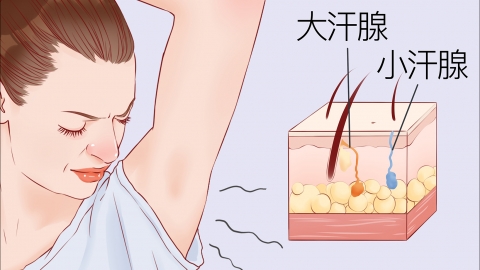What are the causes of body odor?
Axillary osmidrosis generally refers to axillary bromhidrosis. Under normal circumstances, axillary bromhidrosis may be caused by excessive secretion of apocrine glands in the armpit, inadequate local hygiene, damage to the skin barrier in the armpit area, bacterial infection in the armpit, hyperhidrosis, and other reasons. It is recommended to seek timely medical advice, identify the underlying cause, and improve the condition under a doctor's guidance through general treatments, medications, and other methods. A detailed analysis is as follows:

1. Excessive secretion from axillary apocrine glands: During puberty or after strenuous exercise, changes in hormone levels or accelerated metabolism can lead to increased secretion from the apocrine glands in the armpits. The sweat is then decomposed by bacteria, producing an odor. Choose loose, breathable cotton clothing in daily life to reduce stuffiness in the armpit area.
2. Inadequate local hygiene: Long-term neglect of armpit hygiene can lead to the accumulation of sweat, sebum, and shed keratin, providing conditions for bacterial growth and worsening the odor. Wash the armpits daily with warm water, optionally using a mild body wash, and dry thoroughly with a towel afterward. Change clothes 2-3 times per week to avoid odor residue being absorbed by the fabric.
3. Damage to the axillary skin barrier: Frequent use of irritating cleansing products or excessive rubbing of the armpit area may damage the skin barrier, making it easier for bacteria to invade and thus exacerbating the odor. Discontinue the use of irritating cleansing products and choose a gentle moisturizing lotion to apply to the armpit area to repair the skin barrier.
4. Armpit bacterial infection: Imbalance of the skin microbiota in the armpit area leads to excessive proliferation of bacteria such as Staphylococcus aureus and Staphylococcus epidermidis, which decompose organic substances in sweat, producing a pungent odor. Patients should apply medications such as aluminum chloride solution, formaldehyde solution, or urotropine solution to the armpits as directed by a doctor to inhibit bacterial activity and reduce odor production.
5. Hyperhidrosis: Abnormally overactive sympathetic nerves cause sweat secretion in the armpits far beyond normal needs, and the persistently moist environment aggravates bacterial growth and odor. In addition to daily hygiene practices, patients may use medications such as tolterodine tartrate tablets, oxybutynin tablets, or solifenacin succinate tablets under medical guidance to regulate nerve function.
In daily life, avoid eating strongly odorous foods such as garlic, onions, and Chinese chives to reduce sources of odor. Maintain a regular sleep schedule, avoid staying up late, and prevent further endocrine disorders to help alleviate symptoms of axillary bromhidrosis.






